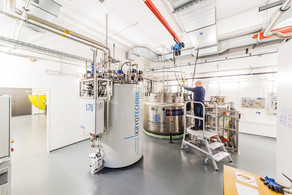Thesis defense of Lena Heuchel
- Defense
Radiotherapy is a high-precision treatment of malignant diseases. However, for some specialized techniques, e.g., total body irradiation (TBI) and proton therapy, considerable uncertainties remain regarding the applied effective dose. For some TBI techniques, no CT-based treatment planning is performed, therefore 3D dose distributions are unavailable. For proton therapy, the relative biological effectiveness (RBE) compared to standard photon irradiation is variable and subject to high uncertainties, particularly at the end of the proton range. Clinically, however, a constant RBE of 1.1 is assumed, since precise knowledge of the RBE distribution in patients, and therefore of the applied biological effective dose, is lacking. Two surveys among German and European clinics were performed to analyze the current clinical practice for TBI and proton therapy, respectively. These surveys showed that participating centers wish for new and improved guidelines for treatment planning, but important tools for analyzing the needed clinical data are missing. Therefore, these necessary tools were developed and tested by performing in silico patient irradiation studies. For TBI, a Monte Carlo-based simulation workflow was developed allowing for 3D dose calculations for non-CT-based TBI techniques. For proton therapy, a novel concept was introduced allowing for the reduction of dose components associated with high RBE uncertainties.









